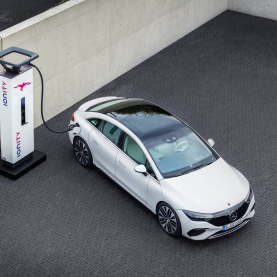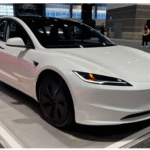Yes, electric cars can overheat—just like gas cars. But it’s not something that happens often. When it does, it’s usually due to battery stress, fast charging, or very hot weather. Luckily, electric vehicle makers build smart systems to stop it from going too far.
People often think electric vehicles are fire-prone or can’t handle the heat. But that’s not true for most new models. Understanding how they work helps ease that fear.
Let’s go step-by-step to see what causes overheating, when it can happen, and how electric vehicles handle heat better than you might expect.
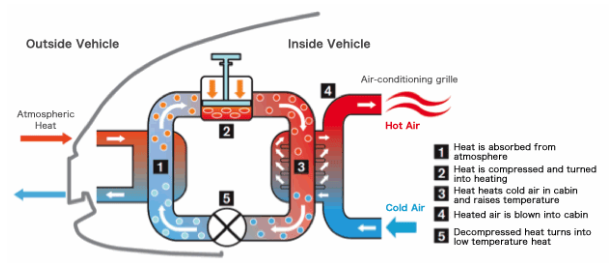
Nissan Heat Pump Cabin Heater
Source: https://www.engineering.com/hot-air-thermal-management-in-electric-vehicles/
Why Do Electric Cars Overheat? Common Heat Problems in Electric Vehicles
Overheating in an electric vehicle can come from a few main areas:
1. Battery Heat Buildup
The battery is the heart of an electric vehicle. If it gets too hot—over 40°C (104°F)—its performance drops. Charging or driving hard in the heat can cause this. If not cooled down, it can damage battery cells.
2. Electric Motor and Inverter Heating
The motor and inverter spin fast and handle a lot of power. That creates heat, especially going uphill or on long drives. If the cooling system isn’t strong enough, things can get too hot.
3. Charging—Especially Fast Charging
Fast chargers push a lot of power into the battery quickly. This creates heat inside the battery. If done repeatedly in hot weather, the system may slow down charging to avoid overheating.
4. Cooling System Failure
If the cooling system (fans, pumps, or coolant lines) breaks or stops working, heat can’t escape. That’s when trouble really starts.
Do Electric Cars Overheat in Hot Weather? Electric Vehicles vs Summer Heat
Yes, they can. But modern electric vehicles are better at handling heat than people assume.
What Happens to an Electric Vehicle in Summer?
- If parked under the sun, the cabin and battery can heat up.
- Batteries get less efficient above 35°C (95°F).
- Some cars reduce power output or charging speed to protect the battery.
- Cooling the interior drains the battery faster.
For example, Tesla allows drivers to start air conditioning through the app before getting in. Hyundai’s electric vehicles also cool the battery while charging. These features help avoid heat stress.
Cold Weather Can Still Lead to Heat Problems—Strange but True
It sounds odd, but cold weather can also cause heat-related stress in electric vehicles.
Here’s Why:
- Cold batteries give less power, so the system pulls more energy to move the car.
- That extra energy use makes other parts work harder—and heat up.
- Heaters and defrosters also use power, which adds to the system load.
Even in freezing conditions, the electrical load can heat up motor parts if cooling is weak.
How Do Electric Cars Stay Cool? Electric Vehicle Cooling System Breakdown
Electric vehicles use active cooling systems—often smarter than in gas cars.
Liquid Cooling Systems (Modern Electric Vehicles)
- Coolant flows through pipes around the battery, motor, and inverter.
- A pump circulates the liquid.
- Heat is sent to a radiator or chiller and pushed outside the car.
Used in:
Tesla Model 3, Model Y
Hyundai Ioniq 5
Ford Mustang Mach-E
VW ID.4
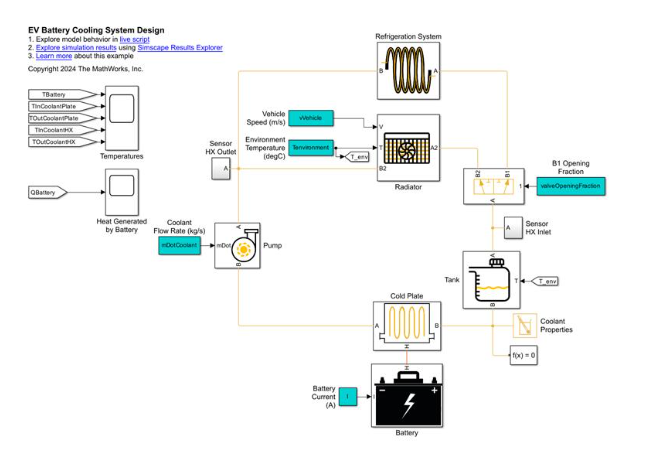
Source: https://www.mathworks.com/help/hydro/ug/EVBatteryCoolingSystemDesign.html
Air Cooling Systems (Some Older Electric Vehicles)
- Fans blow air over battery parts.
- Less effective than liquid cooling.
- Common in older Nissan Leafs or small city electric vehicles.
Smart Software Keeps It in Check
Most electric vehicles have sensors that watch temperatures closely. If things get too hot:
- Fans speed up
- Charging slows down
- Power output drops
- You get a warning to pull over
What Happens If an Electric Car Overheats? Worst-Case: Battery Fire or Thermal Runaway
Overheating usually just slows your electric vehicle down—but in extreme, rare cases, it can cause thermal runaway.
What Is Thermal Runaway?
- One part of the battery overheats and breaks down.
- This triggers nearby cells to overheat too.
- It spreads like a chain reaction—building intense heat.
- Can lead to smoke, fire, or even explosion in worst cases.
This has happened with some Chevy Bolt and Tesla vehicles, mostly when parked and charging overnight. Carmakers have since recalled and replaced the faulty battery packs.
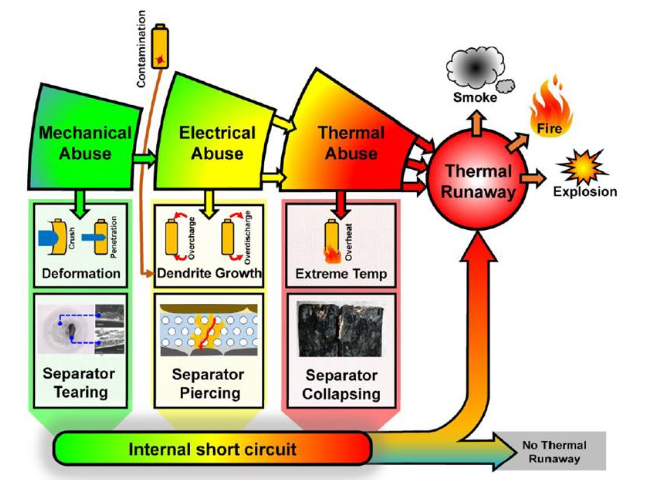
Thermal Runaway in Lithium-Ion Battery
Source: https://www.wattalps.com/thermal-runaway-propagation-and-mitigation/
See full NTSB report on EV fires here:
https://www.ntsb.gov/investigations/AccidentReports/Reports/HIR2303.pdf
How Carmakers Protect Electric Vehicles from Overheating
Electric vehicle manufacturers know heat is a risk. That’s why most new models include:
Real-Time Monitoring
- Sensors track temperature in every battery module.
- If one cell overheats, the car can shut down charging or reduce power.
Advanced Cooling Hardware
- Some cars use glycol (a special coolant) to manage heat.
- Dual circuits for the motor and the battery help spread out the cooling load.
Over-the-Air Fixes
Tesla and other brands send updates to improve heat control remotely.
Failsafe Modes
If cooling systems fail:
- Charging stops
- Warning lights flash
- In some cases, the car enters “limp mode”, driving slowly to prevent damage
EV Overheating vs Gas Car Overheating: What’s Safer?

Why People Worry About Electric Vehicle Overheating: The Psychology Behind It
Many drivers fear what they don’t fully understand:
- Electric vehicles are newer and more tech-heavy.
- News of electric vehicle fires spreads fast—even if rare.
- People feel less in control since much of the heat management is automatic.
- Charging or driving during heat waves makes people nervous.
This fear is natural. But the actual stats show modern electric vehicles are very safe when used correctly and maintained.
Final Thoughts: Do Electric Cars Overheat? Yes—But Only Sometimes and Rarely Seriously
So, can electric cars overheat? Yes. But they’re designed not to let it turn into a disaster.
With modern cooling systems, real-time sensors, smart software, and auto-safety shutdowns, most drivers will never face a serious overheating problem. Electric vehicles are built with layers of protection that often go beyond what gasoline cars offer.
Still, it’s wise to:
- Avoid fast charging constantly in summer heat.
- Park in the shade when you can.
- Keep your car software updated.
- Get your cooling system checked at regular service intervals.
And remember—a warm battery is normal, but a dangerously hot one is not. Electric vehicles are smart enough to know the difference.
